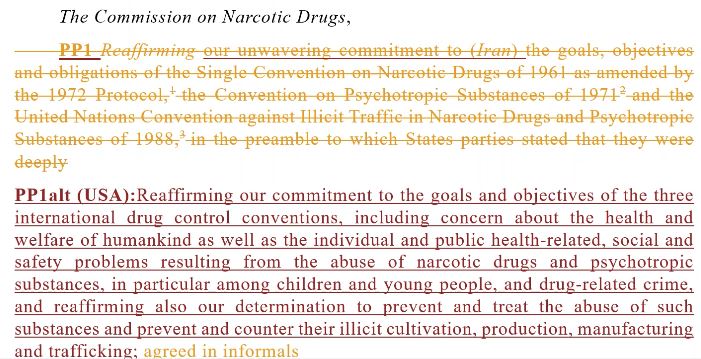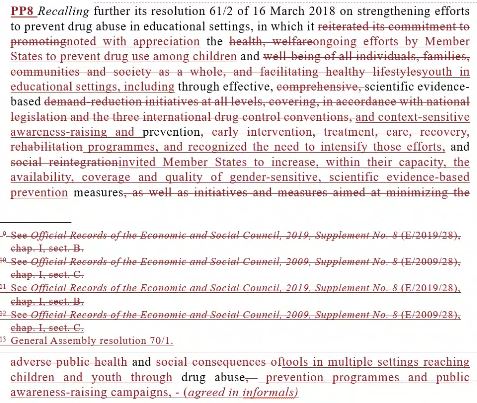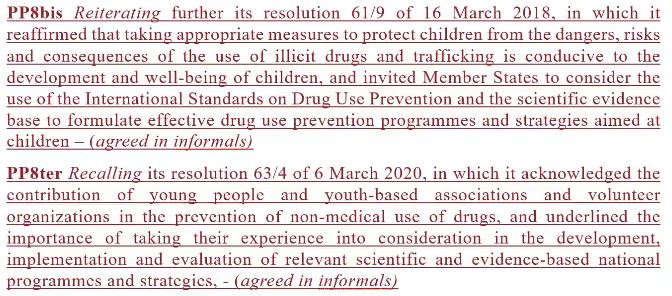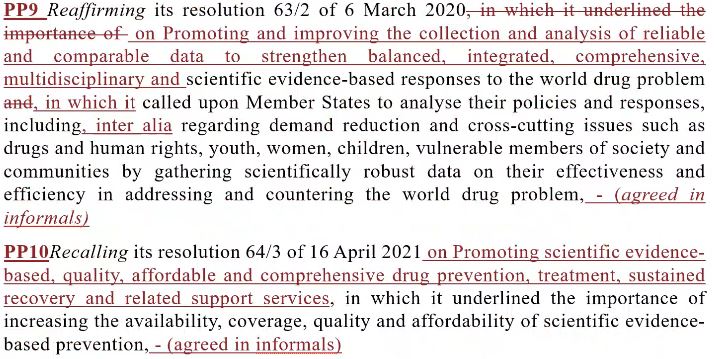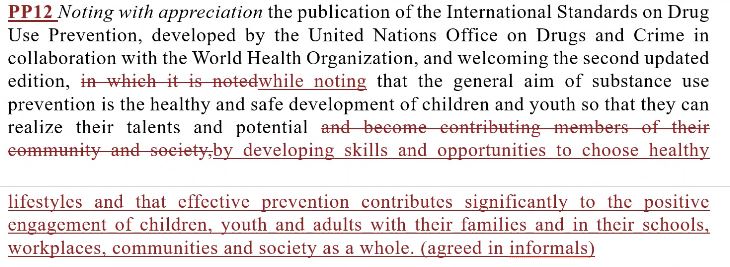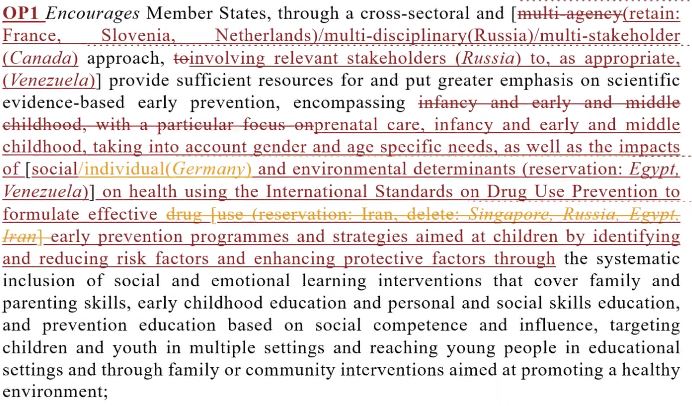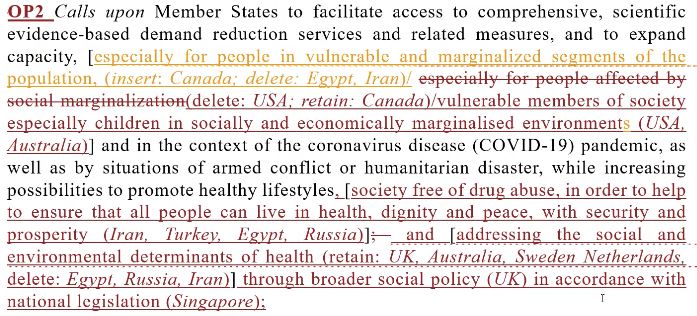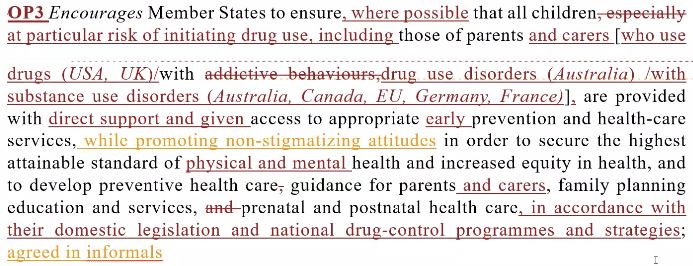Venezuela: Question about the schedule for today’s CoW. Are we going to work two hours still? When do we come back? Are we running beyond schedule?
Chair: I intend to go from 3-5PM, then 6-8PM. We have an hour for this resolution, L5. Then L6. But I received requests not to have that resolution in CoW yet. If we can’t bring L6, then I will take on L2 at 6PM.
Slovenia: Very successful consultations. Just a few paragraphs to discuss further at informals. Just a comment on the text in front of you. You see a compared text between the original version and the changes to the text. A lot of text in tracked changes are already agreed. We have bracketed open questions. We can begin considering the text.
Chair: PP1 deleted?
Slovenia: Yes, we keep PP1Alt.
Turkey: Unfortunately, we prefer keeping the first paragraph. We prefer to see the phrase ‘obligations’: Goals, objectives and ‘obligations’.
Iran: We didn’t agree deleting PP1. I need to consult because it seems there was a mistake.
Chair: I have concerns because the way in which this was presented, the text, is not the way in which others have been presented. I ask the Secretariat if this text complies with requirements of meetings.
Secretariat: Yes, the text complies with formal requirements. I don’t see a problem with the text being negotiated.
Chair: I was just wondering where are the proposals and brackets? Ah, I see them now. Ok, it seems deleting PP1 is not agreed. Let’s consider PP1Alt.
United States: We had discussions about PP1 and PP1 Alt in informals. We requested to delete ‘obligations’ from the draft because this resolution deals with early prevention. This is not an obligation from the Treaties, but something associated with the goals and objectives that we have agreed to. That did not enjoy consensus. ‘Obligations’ was important. So we proposed ‘Recalling’ the obligations. When agreed in informals, a delegation tabled a reservation. Happy to work on PP1. PP1 Alt was a means to find consensus on this ongoing issue.
Chair: Comments?
Russian Federation: Our delegation wasn’t present at informals. When it comes to PP1 and Alt, the discussion started when we joined informals. With regard to the US saying that there are no ‘obligations’ on prevention in the Conventions; Article 38 does talk about prevention of abuse of drugs. There are special obligations in the Convention about prevention of drug abuse.
Iran: Regarding PP1 Alt, it’s good language. But PP1 is an important PP because it refers to the Conventions. Resolution 64/5 ‘reaffirms the goals, objectives and obligations of the Single Convention and other conventions’. PP1 was based on agreed language, not new language. We want to retain PP1.
Chile: We are very flexible but would like to make some progress. It seems that we are stuck in here. If we leave the sentence more simply: ‘reaffirming our commitments to the Convention’. No need to make separations between goals, objectives and obligations. We can leave it more general.
United States: We appreciate the reference to resolution 64/5, but this is the only time this has mentioned. A much more common formulation is ‘goals and objectives’. It’s not a binding precedent. A suggestion was raised also at informals ‘Reaffirming our commitments to the goals and objectives of…and recalling the obligations arising from…’. This separation allows us to commit to goals and objectives, and that commitment needs to be reaffirmed. Obligations are a fact written on the page of the treaty. It doesn’t need to be reaffirmed. We rarely reaffirm facts, but rather commitments or ideas.
Egypt: We could retain the original language. We reaffirm our commitments; we don’t recall our commitments… and obligations to the 3 conventions. We would like to retain this. Maybe we can work on pp1alt in informals if possible?
Iran: In other resolutions, we have the same language that we reaffirm our commitment to conventions. I think recalling obligations and bringing in other documents is kind of taking power away from the conventions, so we prefer the original language.
Russia: The thing here is that we have two options. We can stick to pp1alt, but we would like to keep pp1 and would propose “reaffirming the obligations rising from”. This is what Iran proposed before I believe. Then there will be a balance between obligations and objectives.
Slovenia: We are getting bogged down here so I propose to check if this latest version is acceptable. If not, we can go back to informals and strike out the agreed-on language in alt as it seems not all delegations were present at informals.
USA: It is very difficult to accept language reaffirming obligations when we know one delegation in particular is not adhering to the 1988 convention that requires that we do not interfere in the domestic matters and geographical sovereignty of other states, so we can strike this.
USA: pp2bis used to be a part of pp1 but we made a separate para and added grammatical changes. This was agreed in informals.
Chair: Agreed in CoW.
PP1ter
Chair: Agreed in CoW.
PP2, PP3
Chair: Agreed in CoW.
PP3bis goes straight to informals.
PP3ter
Slovenia: This is still a work in progress as well as PP4alt. We are somewhere in the middle of finding a solution to the listing of policy documents. We recommend taking them back to informals.
PP6
Slovenia: Just to explain, this is also a listing of policy documents, so we deleted this as we are working on the previous paras.
PP6 alt, PP7
Chair: Agreed in CoW.
PP8
Slovenia: We have a lot of changes here, but all of them were agreed in informals.
Chair: Very well. Agreed in CoW.
PP8bis, PP8ter
Chair: Agreed in CoW.
PP9, PP10
Chair: Agreed in CoW.
PP11
Slovenia: We had here a reservation from Venezuela on “adverse childhood experiences” and some others as well, so we relegate it back to informals. We had lots of conversation on social marginalization. The issue is not yet solved, so I propose to take it back informals.
PP12
Venezuela: I completely agree with the sponsors to take some of these paras back to informals, but I would like to say: our reservation is based on the fact that all MS have provided us with definitions, but these two concepts are still unclear… is it possible to provide more information from the Secretariat or the UNODC? Does this have relevance to CND? We have received help from colleagues but we don’t have precedence here for this to be used in terms of drug use and prevention. If these terms are not used, then we would like to know what else can we put in the text.
Chair: I am turning to the UNODC representative in the room.
UNODC: Adverse childhood experience is a type of vulnerability as described – cognitive, emotional needs are sometimes exposed to adversities that complicate issues in early development. From a contextual perspective, these concepts are mentioned.
PP13
Chair: Agreed in informals it says. Comments? No. Agreed in CoW.
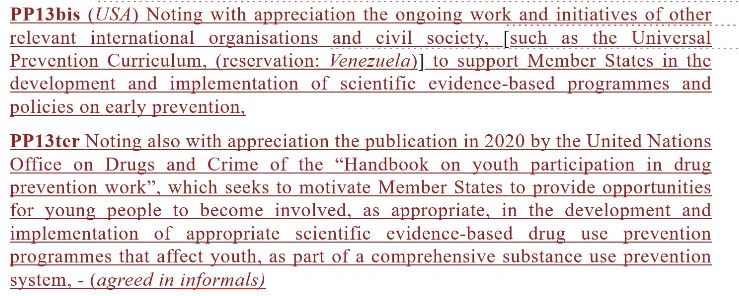
PP13bis
Slovenia: There is a reference to the Universal Prevention Curriculum. No consensus until now, so I guess we will go to informals.
Venezuela: I wanted to explain to you our reservation. This regards the terminology used. In some regional organisations the terminology is used, not UNODC’s terminology. We are willing to work with the sponsors in informals. This is imported from a different forum. We look forward to finding consensus.
PP13ter
Chair: Agreed in informals it says. Comments? None? Agreed in CoW.
OP1
Slovenia: We have made progress on this paragraph today. We had the question of drug use here. With regard to early prevention. Delegations preferred to delete the reference and talk about early prevention in more general terms. We still have 2 questions: 1) Multi-agency approach: not acceptable to some delegations. Conflicting proposals listed. 2) Reference to social and environmental determinants of health: a question recurring in two other paragraphs; we’d need to address this in informals together comprehensively. I would suggest to move onwards.
OP2
Slovenia: Recurrent issues of ‘marginalised populations’ and ‘social detemrinantes of health’. No solution yet. We need to find a solution to apply to all paragraphs.
Chair: Any OP approved in informals?
Slovenia: Yes
OP3
Chair: Comments? No? Agreed in CoW.
United States: If we may, we just want to make sure we know what we’re agreeing. We want clarity on what option we’ve gone with.
Slovenia: Apologies. It seems that in the rush to deliver the most recent version of the resolution, we forgot to strike out the options not agreed. I ask for flexibility of the delegations. It seems ‘Substance use disorders’ was agreeable in informals today.
United States: This is helpful. We agree. We can move on.
Venezuela: This is a request that we have in format. This text was cleaned and references to specific language and who made the suggestions were deleted. We want to know exactly where we were. Let’s avoid deleting the previous references of the countries that have participated. It would be helpful to us. We don’t have comments on this paragraph.
Egypt: We don’t see consensus in this paragraph.
Chair: Let me ask again. Is it agreed in CoW?
Egypt: We agree with the formulation. Yes.
Chair: Any comments on OP3? Can we consider it agreed in CoW? Yes.
Iran: We have ‘at risk of initiating drug use’. We propose ‘drug abuse’.
Slovenia: Just an explanation. We revisited this numerous times. There were no indications in informals that this would be problematic language. I’m surprised to hear that we’re going back to this.
Chair: We’re talking about children. There is no need to talk about abuse. This is about use. Being children, I don’t think we need to wait until this becomes abuse. We want to prevent the early use of drugs. Is this OK with Iran? Does the delegate of Iran insist on ‘abuse’?
Iran: Let us come back to this. I will consult with capital. We use certain drugs to treat diseases for children.
Chair: This needs more work, then. This goes to informals.
OP3bis
Chair: Unusually short! Really nice. Comments? No? Agreed in CoW. Secretariat, please inform us of the presentation of resolution at 6PM.
Secretariat: The resolution to be taken up at 6PM will be L2.
Chair: Thanks.
